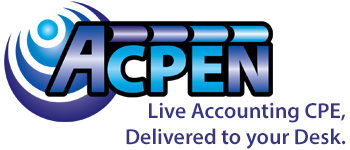No programs are for sale on this catalog.
In order to purchase one of our programs, please visit catalog.acpen.com.
Why Section 530 of the Revenue Act of 1978 Applies to the States
Total Credits: 3 including 3 Taxes - Technical
- Average Rating:
- 6
- Categories:
- ACPEN Industry Institute | ACPEN Tax Institute | IRS Approved | Tax
- Speaker:
- David Randall Jenkins, Ph.D.
- Course Levels:
- Intermediate
- Duration:
- 3 Hours
- Product Type:
- Live Webcast Replay
- License:
Description
This webcast’s bold claim is Section 530 of the Revenue Act of 1978 applies to the states. The issue is topical given the Obama Administration’s current use of Memoranda of Understanding among the IRS, DOL, and several states to challenge independent contractor misclassification. The transparent MOU purpose is to circumvent employment tax constraints Congress imposed on IRS subtitle C determinations in furtherance of, inter alia, Affordable Care Act objectives. However and as the webcast demonstrates, when Congress enacted Section 530 it contextually qualified the subtitle C definitional infrastructure. Well settled dual federal-state employment tax jurisprudence imposes an obligation each state act must be coterminous, harmonious, and uniform with the federal progenitor. Since Congress has never impounded Section 530 in the Internal Revenue Code, per se, it may well be the provision’s contextual qualification extends beyond title 26 boundaries.
Syllabus
Lesson 1.
Introduction
Lesson 2.
The Plan to Circumvent Section 530
Lesson 3.
Uniform and Harmonious Acts
Lesson 4.
Coterminous Federal and State Acts
Lesson 5.
Contextual Qualification
Lesson 6.
Indiana v. Missouri
**This course is approved by the IRS. The submission of a completed request form, found under the materials tab, is required for credit.
Basic Course Information
Learning Objectives*Recognize the history of uniform and harmonious federal and state tax acts correctly requires the several state employment acts must be uniform and harmonious among themselves with respect to FUTA
*Recognize the history of the Federal Unemployment Tax Act correctly requires the several state employment acts be coterminous with FUTA
*Recognize contextual qualification as a form of statutory construction correctly derives from the Supreme Court’s 1981 Rowan decision
*Recognize Section 530 of the Revenue Act of 1978 correctly and contextually qualifies the definition of an employee throughout the entire United States Code
*Recognize that as a result of contextual qualification Section 530 of the Revenue Act of 1978 applies to the states and requires the several state employment acts to be correctly coterminous, uniform, and harmonious with FUTA and be harmonious and uniform among themselves
*Recognize Indiana’s application of its employment act correctly and substantively impounds Congress’s will with respect to Section 530’s contextual qualification of federal and state employment tax acts
*Recognize Missouri’s employment tax act fails to correctly and substantively impound Congress’s will with respect to Section 530’s contextual qualification of federal and state employment tax acts
Major Subjects
*The Obama Administration’s plant to make an end run around Section 530 of the Revenue Act of 1978 in furtherance of Affordable Care Act interests
*The history of uniform and harmonious federal and state tax acts Coterminous Federal and state unemployment tax acts
*Contextual qualification as a form of statutory construction
*The Supreme Court’s 1981 Rowan decision implicates contextual qualification as a form of statutory construction
*Section 530 of the Revenue Act of 1978 contextually qualifies the entire United States Code
*Section 530’s contextual qualification of Chapter 23, FUTA, imposes an obligation on state acts to be conterminous, uniform, and harmonious with the federal act
*Indiana doesn’t like Section 530 but obeys Congress’s will that it contextually qualifies Chapter 23’s FUTA provisions and that the state acts must be thereby coterminous, harmonious, and uniform
*Missouri has enacted an illusory effort to obey Congress’s Section 530 command
*The Missouri House of Representatives passed a bill to allow its employers to claim Section 530 relief for state unemployment tax purposes if the IRS has granted Section 530 relief for FUTA purposes
Course Materials
| Jenkins_Credentials (0.09 MB) | 5 Pages | Available after Purchase |
| Section_530_Revenue_Act_of_1978_Handout (1.24 MB) | Available after Purchase | ||
| Section_530_Revenue_Act_of_1978_Slides (3.89 MB) | Available after Purchase | ||
| Section_530_Revenue_Act_of_1978_Article (0.20 MB) | Available after Purchase | ||
| Important CPE Credit Instructions_READ BEFORE WEBCAST UPDATED (0.47 MB) | Available after Purchase | ||
| IRS CE Credit Request Form (0.15 MB) | Available after Purchase | ||
Speaker

David Randall Jenkins, Ph.D. Related Seminars and Products
David Randall Jenkins, Ph.D., received his doctorate in accounting and a master’s in accounting with an emphasis in tax from the University of Arizona. He has taught financial, managerial, and tax accounting courses at both the graduate and undergraduate levels. Dr. Jenkins is an AACSB academically qualified business school and tax professor owing to his peer reviewed journal article publications. His company, Algorithm LLC (algorithm-llc.com), is an IRS Approved Continuing Education Provider. Dr. Jenkins may be contacted at tucjenkins@aol.com.
Additional Info
Basic Course Information
Original Recording Date04/27/2016
Date Added to Catalog
04/18/2016
Prerequisites
This webcast is an intermediate continuing education webcast.
It is assumed the webcast participant has fundamental familiarity with Section 530 of the Revenue Act of 1978.
Advanced Preparation
None
Designed For
*CPAs
*Attorneys
*Enrolled Agents
Course Developer
David Randall Jenkins
Yellow Book
No
Additional Information
Instructional Delivery MethodGroup Internet Based
Complaint Resolution Policy
Please contact Anne Taylor for any complaints. anne.taylor@acpen.com, (972-377-8199).
Official Registry Statement
Business Professionals' Network, Inc. is registered with the National Association of State Boards of Accountancy (NASBA) as a sponsor of continuing professional education on the National Registry of CPE Sponsors. State boards of accountancy have final authority on the acceptance of individual courses for CPE credit. Complaints regarding registered sponsors may be submitted to the National Registry of CPE Sponsors through its website: www.nasbaregistry.org
Refund/Cancellation Policy
Please contact the ACPEN help desk 1-877-602-9877 or help@acpen.com if you wish to cancel your attendance for a previously purchased webcast and are requesting a refund or transfer.
Course Registration Requirements
Online Registration
Reviews
| 5 |
|
| 4 |
|
| 3 |
|
| 2 |
|
| 1 |
|


